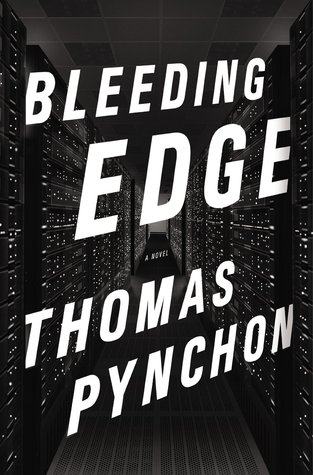I'm not going to do a standard review of Thomas Pynchon's newest book 'Bleeding Edge'. If you want a plot synopsis of it you can find them scattered across the Internet with a Google search. What I am going to do is give some assorted thoughts on Pynchon's new book.
1. First off I'm going to say I didn't love this book the way I thought I would but it was still a very good book. I do recommend reading it, along with other books I've reviewed, to form your own opinion.
2. I guess my biggest problem with 'Bleeding Edge' is that it feels like a bunch of different authors books rolled into one. You have typical Pynchon paranoia and conspiracy but you also have Elmore Leonard's heroine (MAXINE TARNOW IS A BADASS WOMAN WHO CARRIES A GUN!) Tom Wolfe-Bonfires of the Vanity style parties, and Phillip Roth's Jewishness premeditating throughout the entire novel. It's like a novel version of a fruitcake. Some of it works, some of it doesn't.
3. Definitely Pynchon's most straightforward novel and possibly his easiest novel I've read (I haven't read Inherent Vice so I can't comment on that book). He doesn't get too cute with language or stories about alien abduction or attacks by octopuses.
4. Tell you a little about myself, I was born in 1988 and didn't really begin to have a taste in music, TV, or movies until really 1998 (which was an awful period for music really).
I bring this up because 'Bleeding Edge' is filled with pop culture references from the late 90's until 2001. He talks about Rachel's haircut, Shania Twain, Britney Spears, Beanie Babies, Baywatch and Carmen Electra, and much more. And because I grew up during this era it's beyond bizarre to read about this stuff in a Pynchon novel. I relived my horrible pop culture childhood.
5. Pynchon's depictions of bloggers is something old people like Buzz Bissinger would be proud of.
6. The Internet as a whole is also looked on as something that is evil described by Maxine's father, “creeps now like a smell through the smallest details of our lives, the shopping, the housework, the homework, the taxes, absorbing our energy, eating up our precious time.” Is that a character in a novel or my mother?
7. I did enjoy how Pynchon used 9/11 in the novel. Updike and Don Delillo tried to turn 9/11 into novels and explain that day's significance. And the truth is that day was so horrendous that it's hard to imagine it happened. Pynchon simply puts Maxine in our own shoes during that day, "Maxine goes home and pops on CNN. And there it all is. Bad turns to worse. All day long." Perfect. No philosophical debate about that day. No conspiracy theories. Just that she watched everything on TV like the rest of us.
8. Gabriel Ice, the villain in the novel, isn't a very interesting character.
9. In fact none of the characters, except Maxine ,are that interesting at all. There just isn't a lot of depth between all of them. And even Maxine isn't as interesting as the main characters in "Lot 49", "Gravity's Rainbow", and "Mason & Dixon".
10. While the book has it faults, I did enjoy reading it. It's refreshing to know that Pynchon can write a straightforward conspiracy book with characters that actually have normal names. True it isn't his best work and it does come off very lighthearted, but that is also it's greatest strength. It's conspiracy and lightheartedness all come off as a Pynchon inside joke. Like he's making fun of the absurdness of his previous great works.

I stopped caring for Pynchon after 'Against the Day' was published. He should have stopped after 'Mason & Dixon'.
ReplyDelete